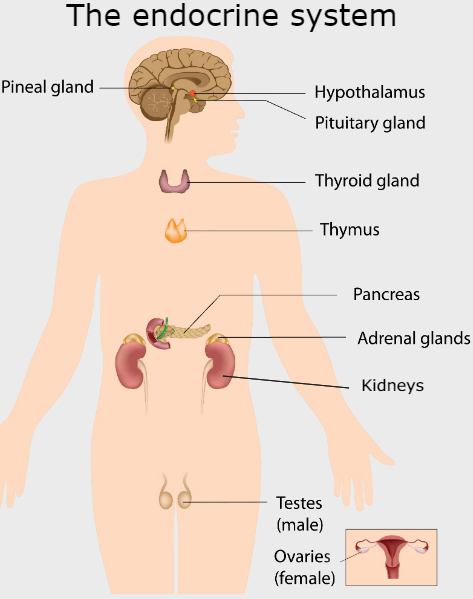Healthdirect Free Australian health advice you can count on.
healthdirect Australia is a free service where you can talk to a nurse or doctor who can help you know what to do.
Pituitary gland and hormones
Key facts
- Your pituitary gland is found at the base of your brain.
- The pituitary gland makes many different hormones.
- Some of the hormones made in your pituitary gland signal other glands in your body, telling them to make hormones.
What is the pituitary gland?
The pituitary is a small, pea-sized gland. It is found at the base of your brain, in line with the top of your nose.
Your pituitary acts as your body’s ‘master gland’. It tells other glands in your body what to do.
What does my pituitary gland do?
The pituitary gland is an important part of your endocrine (hormone) system. It makes many different hormones.
Some of these hormones have a direct effect on your body. Other hormones control the actions of other glands that also make hormones.

What hormones does my pituitary gland make?
- growth hormone — which regulates growth
- thyroid stimulating hormone (TSH) — which tells the thyroid gland to make hormones
- prolactin — which controls breast milk production
- adrenocorticotrophic hormone (ACTH) — which tells the adrenal glands to make hormones
- follicle stimulating hormone (FSH) — which is involved in the reproductive system
- luteinising hormone — which is also involved in the reproductive system
Your pituitary gland also stores and releases:
Your pituitary gland is controlled by your hypothalamus. The hypothalamus is found in your brain, above the pituitary gland. It tells your pituitary gland to make pituitary hormones.
Medical conditions related to the pituitary gland
Sometimes your pituitary gland can make too much or too little of a hormone. This causes a ‘pituitary condition’.
Pituitary conditions are often caused by growths in your pituitary gland. These cause hormone problems. These masses are usually not cancerous. They only cause problems when they change hormone levels or take up too much space.
Other causes of pituitary conditions can include surgery, radiation therapy, infection or trauma to the head. Problems with the hypothalamus can also cause a pituitary condition.
Treatment for pituitary conditions depends on the cause and the hormones affected.
Prolactinoma
A prolactinoma is a benign mass (tumour) on your pituitary gland that makes prolactin. Prolactinomas cause hyperprolactinaemia (too much prolactin in the blood).
A female with hyperprolactinaemia might:
A male with hyperprolactinaemia might have:
There are also other causes of hyperprolactinaemia, including some medicines.
Hypopituitarism
Hypopituitarism is when your pituitary gland doesn’t make enough of one or more of the pituitary hormones. This in turn affects hormones produced by other glands in your body.
The signs and symptoms can appear very slowly. They also vary from person to person.
Growth hormone deficiency
Growth hormone deficiency is when your pituitary gland does not make enough growth hormone. This might be due to:
It can delay children’s growth and lead to a child being shorter in height than expected.
In adults, the symptoms of growth hormone deficiency can include:
Other pituitary conditions
- gigantism — where a child has too much growth hormone and grows very tall
- acromegaly — where you have too much growth hormone and your hands, feet and face get bigger
- Cushing’s syndrome — where your body creates too much cortisol due to a mass in the pituitary making too much ACTH
Resources and support
You can read more about pituitary gland disorders on the Australian Pituitary Foundation website or Hormones Australia website.
You can also call the healthdirect helpline on 1800 022 222 (known as NURSE-ON-CALL in Victoria). A registered nurse is available to speak with 24 hours a day, 7 days a week.